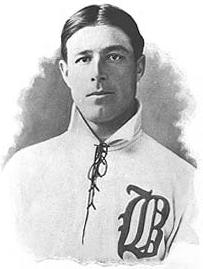Professional Baseball Hall of Famer
James “Jimmy” Collins is regarded as one of the greatest third basemen of all time. Born in Niagara Falls, he was brought to Buffalo at the age of two where he grew up to play sandlot ball. A graduate of St. Joseph’s Collegiate Institute, Collins broke into professional baseball in 1883 with Buffalo in the Eastern League. In 1894 he batted .352 after that season he joined Boston’s National League team. In 1901 he became player-manager of the city’s new American League team, the Boston Puritans, who were sometimes called the Pilgrims.
In 14 seasons in the major leagues, Collins compiled a .294 lifetime batting average. He hit .300 or better five times, including .346 in 1897, his best year. Collins was regarded as the best third baseman of his era. He revolutionized the position by rushing in to scoop up bunts and dribblers barehanded and firing to first with a single motion. He was the first third baseman to run down the left field line for short flys.
In 1903 Collins managed Boston in the first World Series between the American and National Leagues, an event he helped to create. Collins assured Ban Johnson, president of the American League, that he had the pitching to beat the Pirates, who had just won their third straight National League flag. It was only after Collins’ assurances that a nine game series was arranged. Collins’ baseball prescience proved prophetic in one of the greatest comebacks in the history of the game. Pittsburgh won three of the first four games, but Boston came back and won four straight to clinch the championship in eight games. For the series Boston pitching held the great Honus Wagner, a .329 lifetime, Hall of Fame hitter, to a .214 average, including just one single in his last 14 times at bat. For the last four games Collins’ pitching staff limited Pittsburgh to just 8 runs, while Cy Young who was 39 at the time, racked up two wins for Boston.
In the ninth inning of game eight, Collins’ baseball savvy helped to shut off a possible Pirate rally. With Boston leading 3-0, the Pirates advanced a runner to second with one out. Collins flashed a signal when the runner took a big lead of the base. The Boston catcher bluffed the throw to second then threw to Collins at third who tagged the surprised runner out. When Wagner struck out to end the game the Boston fans went wild. When Collins arrived back in Buffalo, a brass band and jubilant fans met him at the train station and paraded him to the Iroquois Hotel for a celebration.
In 1908, Collins, who would later serve as a president of the MUNY league, ended his career with the Philadelphia Athletics. He died in 1943. Three years later he was inducted at Cooperstown into the Baseball Hall of Fame.


